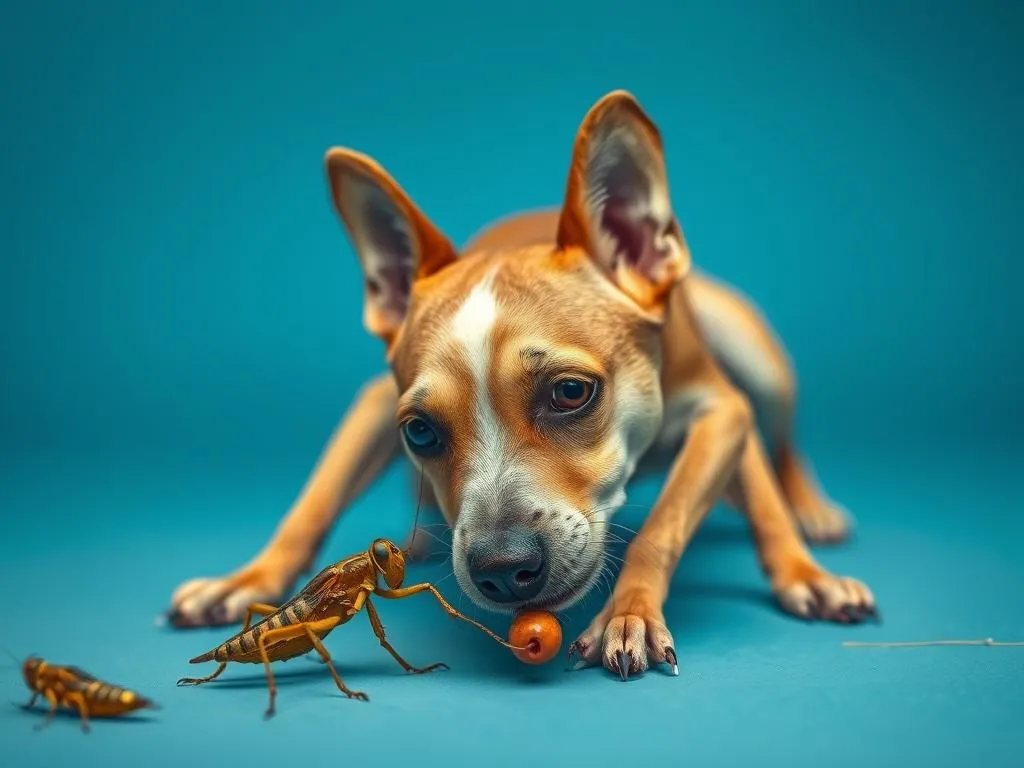
Introduction
Proper dog nutrition is vital for the health and well-being of our furry companions. A balanced diet not only supports their growth and development but also plays a crucial role in preventing diseases and maintaining energy levels. Traditionally, dog diets have relied on common dietary sources like meats, grains, vegetables, and fruits to provide essential nutrients.
In recent years, however, there has been a shift towards exploring alternative protein sources in pet diets. As pet owners become more aware of the environmental and health implications of traditional livestock farming, they are turning to innovative solutions like crickets. This article aims to explore the question: Can dogs eat crickets? We will delve into the benefits and risks associated with incorporating crickets into a dog’s diet.
Understanding Dog Nutrition
Essential Nutrients for Dogs
For a dog to thrive, it requires a well-rounded intake of essential nutrients, including:
- Proteins: Crucial for muscle development, tissue repair, and overall health.
- Carbohydrates: Provide energy and support digestive health.
- Fats: Essential for energy storage and the absorption of fat-soluble vitamins.
- Vitamins and minerals: Play various roles in bodily functions, from immune support to bone health.
Common Ingredients in Commercial Dog Food
Most commercial dog foods contain a variety of ingredients to meet these nutritional needs:
- Meat sources: Chicken, beef, and lamb are commonly used for their high protein content.
- Grains: Rice, corn, and wheat serve as carbohydrate sources, providing energy.
- Vegetables and fruits: These ingredients offer fiber, vitamins, and minerals.
The Role of Protein in a Dog’s Diet
Protein is vital for a dog’s muscle development and overall health. It is essential for repairing tissues, producing enzymes, and supporting immune function. While animal proteins are generally considered high-quality due to their complete amino acid profiles, plant proteins can also contribute to a dog’s daily protein intake. However, they may lack certain essential amino acids, making it crucial to balance the diet.
Crickets as a Protein Source
Nutritional Profile of Crickets
Crickets have emerged as a promising alternative protein source for dogs. Their nutritional profile is impressive:
- High protein content: Crickets contain about 60-70% protein by dry weight.
- Essential amino acids: They provide all nine essential amino acids, making them a complete protein source.
- Vitamins and minerals: Crickets are rich in B vitamins (like B12), iron, zinc, and omega-3 fatty acids.
Environmental Impact of Cricket Farming
One of the significant advantages of using crickets as a protein source is their sustainability. Cricket farming requires considerably less land, water, and feed compared to traditional livestock farming. Insects emit fewer greenhouse gases and can be raised on organic waste, making them an environmentally friendly choice for protein.
Digestibility and Bioavailability
Dogs can digest cricket protein efficiently. Studies suggest that insect protein has a bioavailability comparable to that of more traditional animal proteins. This means that dogs can absorb and utilize nutrients from crickets effectively, making them a viable addition to their diets.
Can Dogs Eat Crickets?
Safety of Feeding Crickets to Dogs
When considering whether dogs can eat crickets, safety is a primary concern. Generally, crickets are safe for dogs to consume, but there are some considerations:
- Potential allergens: Like any new food, crickets can trigger allergic reactions in some dogs. It’s essential to monitor for any signs of allergies, such as itching, swelling, or gastrointestinal upset.
- Risks of overfeeding crickets: Moderation is key. Feeding too many crickets can lead to an imbalance in nutrients or digestive issues.
How to Introduce Crickets into a Dog’s Diet
When introducing crickets to your dog’s diet, a gradual approach is best:
- Recommended serving sizes: Start with a small amount, such as a few crickets or a teaspoon of cricket flour, depending on your dog’s size and dietary needs.
- Gradual introduction process: Slowly increase the serving over a week while monitoring your dog for any adverse reactions.
Forms of Crickets Available for Dogs
Crickets can be introduced to your dog’s diet in various forms:
- Whole crickets: These can be fed as treats or mixed into meals.
- Cricket flour: A powdered form that can be easily added to homemade dog food or commercial kibble.
- Commercial dog food containing crickets: Some brands now offer dog food specifically formulated with cricket protein.
Benefits of Feeding Crickets to Dogs
Nutritional Benefits
Incorporating crickets into your dog’s diet can offer several nutritional advantages:
- Boosting protein intake: Crickets provide a high-quality protein source to support muscle development.
- Source of healthy fats: They contain beneficial fatty acids that support heart health and skin condition.
- Rich in fiber: Crickets also offer dietary fiber, which can aid digestion.
Health Benefits
The benefits of crickets extend beyond nutrition:
- Improved coat condition: The fatty acids found in crickets can enhance coat shine and health.
- Enhanced energy levels: The protein and fat content can provide dogs with sustained energy.
- Potential for weight management: High protein diets can promote satiety, helping dogs maintain a healthy weight.
Behavioral and Psychological Benefits
Feeding crickets can also provide behavioral enrichment:
- Novelty and enrichment in diet: Introducing new food sources can stimulate a dog’s interest in their meals.
- Encouraging exploration and curiosity in food: The unique texture and flavor of crickets may encourage dogs to explore their food more actively.
Potential Risks and Considerations
Allergies and Sensitivities
While crickets are generally safe, it’s crucial to watch for signs of allergies in your dog:
- Signs of cricket allergies in dogs: Symptoms may include itching, swelling, or gastrointestinal issues.
- Importance of monitoring after introduction: Always observe your dog closely after introducing any new food.
Risks of Contaminated Crickets
Not all crickets are created equal, and sourcing matters:
- Sources of contamination: Crickets can be contaminated with pesticides or harmful bacteria if not sourced properly.
- Importance of sourcing crickets from reputable suppliers: Always choose high-quality, human-grade crickets from trusted suppliers.
Not a Complete Diet
While crickets offer numerous benefits, they should not be the sole component of your dog’s diet:
- Importance of a balanced diet: Dogs require a diverse range of nutrients that crickets alone cannot provide.
- Crickets as a supplement, not a replacement: Use crickets to enhance your dog’s diet rather than replace traditional protein sources entirely.
Conclusion
In summary, the question of whether dogs can eat crickets is met with a resounding yes. Crickets present a sustainable, nutritious protein source that can complement a dog’s diet when introduced appropriately. With their impressive amino acid profile and environmental benefits, crickets can be a valuable addition to your dog’s meals. However, always consult with a veterinarian before making significant dietary changes to ensure your dog’s unique needs are met.
FAQs
Can dogs eat raw crickets?
Yes, dogs can eat raw crickets. However, it’s crucial to ensure they are sourced from reputable suppliers to avoid contaminants.
How many crickets can I feed my dog?
Start with a few crickets or a teaspoon of cricket flour, gradually increasing the amount while monitoring for any adverse reactions.
Are there any alternative insect proteins for dogs?
Yes, other insect proteins like mealworms and black soldier fly larvae are also being explored as alternative protein sources for dogs.
What should I do if my dog has an allergic reaction?
If you suspect your dog has an allergic reaction to crickets, discontinue feeding them immediately and consult your veterinarian for advice.
This article provides a comprehensive overview of the potential benefits and considerations of including crickets in your dog’s diet, ensuring that you are well-informed as a dog owner. Always prioritize a balanced diet and consult with a veterinary professional before making significant dietary decisions for your furry friend.









